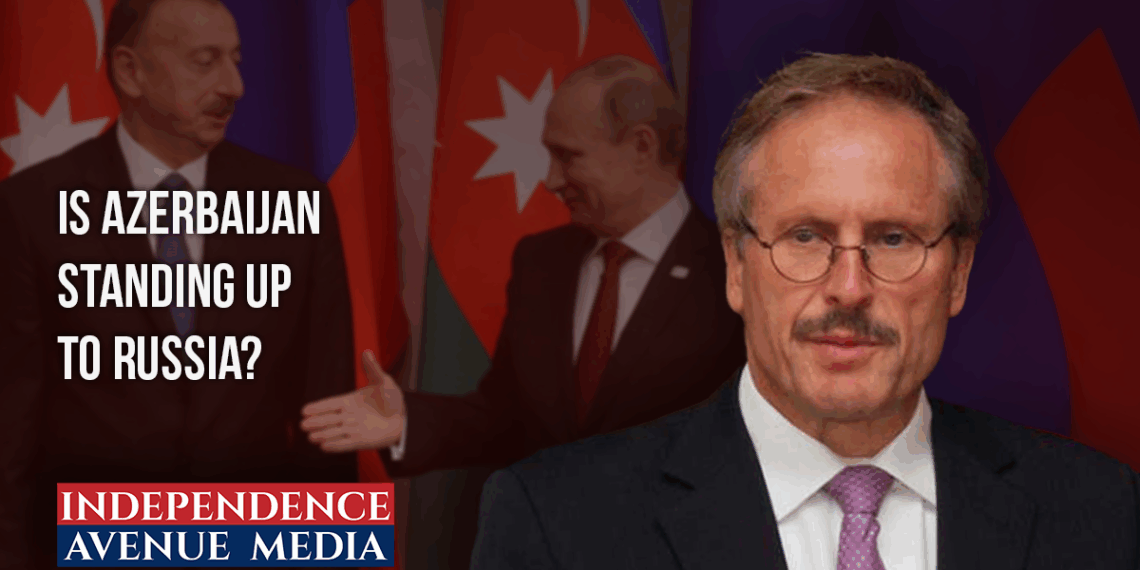WASHINGTON, D.C. (Independence Avenue Media) – Ambassador Robert F. Cekuta, a former senior U.S. diplomat with four decades of experience in international relations, served in key posts across Europe, the Middle East, and Central Asia. Now a lecturer at American University in Washington, Cekuta is uniquely positioned to assess the policy implications of energy, security, and diplomacy in complex regions like the South Caucasus, where he was U.S. Ambassador to Azerbaijan from 2015 to 2018.
Ambassador Cekuta offers Independence Avenue Media insights regarding the latest escalation of tensions between Russia and Azerbaijan. Each country has detained citizens of the other in tit-for-tat arrests that have, to date, resulted in the death of two ethnic Azerbaijani brothers in Russian custody. Baku responded by arresting Sputnik journalists it accused of working with Russian intelligence services.
Cekuta places the unfolding crisis in a longer geopolitical timeline, cautioning that, while Azerbaijan has always had to navigate uneasy ties with Moscow, Russia’s recent actions—including the downing of an Azerbaijani civilian aircraft in December 2024—have heightened tensions and reaffirmed Baku’s drive to safeguard its independence and sovereignty.
The conversation also explores Azerbaijan’s evolving strategic partnerships, particularly with Turkey, and its implications for regional dynamics involving Iran, Armenia, and Georgia. Cekuta notes that while Baku is pragmatic in its foreign policy, it remains deeply aware of Azerbaijan’s precarious neighborhood—being the only country that borders both Russia and Iran—as well as the diminution of Russian power due to its ongoing war in Ukraine.
Finally, the ambassador discusses U.S. interests in Azerbaijan, the fragile state of Armenia-Azerbaijan peace negotiations, and the potential strategic impact of new transit routes such as the Zangezur corridor. He emphasizes that lasting regional peace will require more than a signed agreement—it will demand trust-building, regional integration, and sustained international engagement, including by the United States.
The following interview, conducted on July 3, 2025, has been edited for length and clarity.
Independence Avenue Media Editor in Chief Ia Meurmishvili: Ambassador Cekuta, this interview is very timely, I think, and very important for the viewers to hear your views on what’s happening in South Caucasus right now. Let’s start with the latest news that we have. Russian security services arrested some ethnic Azerbaijanis living in Russia. Two of them [Safarov brothers, allegedly implicated in some murders in Russia years ago] died in the security services’ custody.
As a retaliation, or following shortly after that, Azerbaijan arrested Sputnik journalists, accusing them of being [Russian] FSB agents, and four additional people. So, seven people in total. And this, needless to say, complicated Azerbaijan-Russia relations. Tell us what happened and how do you see these events? What does it mean?
Former U.S. Ambassador to Azerbaijan Robert F. Cekuta: Well, first of all, thank you very much for having me. I’m pleased to have this chance to talk a little bit about Azerbaijan, and also how Azerbaijan fits in a bigger global picture. I think what you sort of sketched out very much puts that in context. Azerbaijan is part of a bigger global picture in dealing with major powers, and not particularly happy powers [like] Russia.
In terms of what happened this past week, I’m going to be coming at this pretty much from press reports. It looks like authorities in Yekaterinburg raided, arrested, first of all the Safarov brothers, and then other Azerbaijanis—Russian citizens who are of Azerbaijani origin.
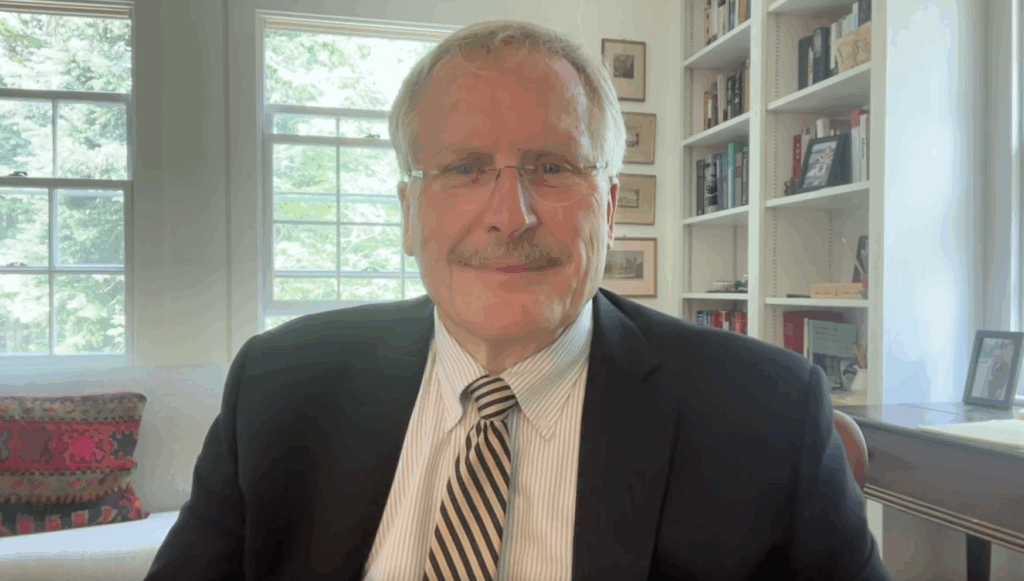
The Safarov brothers unfortunately died. The conditions under which they died are highly suspicious. And I think it comes back to a basic impression that the Russian authorities do not necessarily handle things in the most professional manner.
Azerbaijan sits in a very, very critical and complicated spot on the globe. It borders Russia, it borders Iran, it borders Turkey, hostile, maybe not as hostile as in the past relations with its immediate neighbor, Armenia. Georgia has its own problems, [and] across the Caspian Sea there are other difficulties.
The other point to remember, Azerbaijan is the only country in world that borders both Russia and Iran. In terms of what’s happened this past week, I think it’s an example of what’s happened a number of times, which is that the Russians can sometimes get a little too pushy—maybe there’s a better diplomatic term than that, but I think just to be straightforward here—and overplay a hand.
Azerbaijan is very focused on keeping its independence. It lost it for a number of years—it wants it. Azerbaijanis are nationalistic. They care about their country. They care about where it is in the world. And they understand that they’re in a bad neighborhood. They understand it’s complicated. They understand that they need to try to work out these difficult relations. And I’m not sure that this was necessarily appreciated in Moscow.
Meurmishvili: And it seems like they’re still unhappy about how it was handled by the Russian side.
Cekuta: They are still unhappy, and these things build on each other. And that may be what we’re seeing now. It’s unfortunate. I don’t know whether the Safarov brothers and the others were involved in this series of killings or not. But at this point, when actions like this happen from a police force, you lose the narrative on the possible crime and are then focusing on the mistreatment by the police.
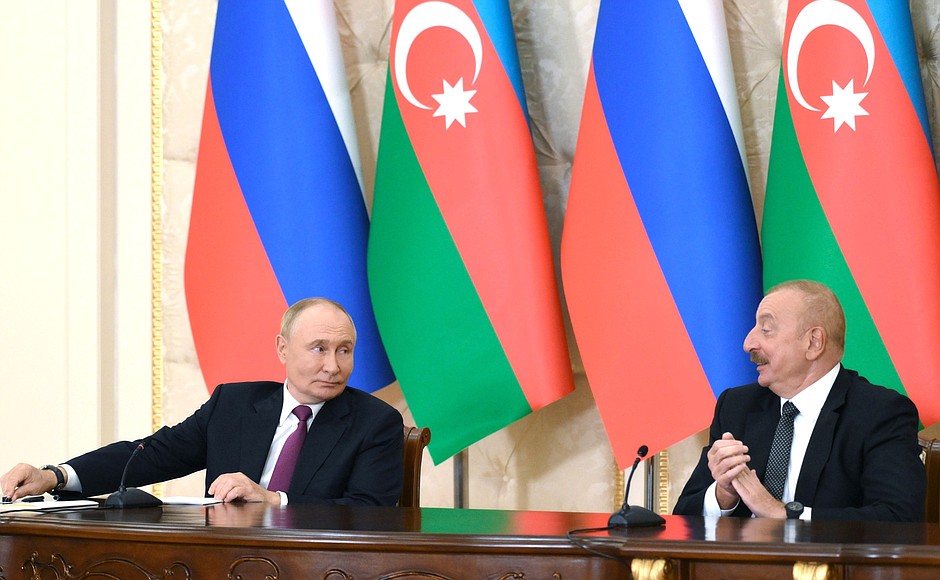
Meurmishvili: What do you make of the fact that Azerbaijani authorities arrested, of all people, Sputnik journalists?
Cekuta: The Azerbaijan authorities have a very realistic understanding of who does what and who’s who and who is doing what for what ends. I’m sure, this was not a spontaneous decision. I’m sure this was something that was considered going forward. Certainly, here in the United States, we’ve had concerns about [Russian state-sponsored] Sputnik and RT [formerly Russia Today] journalists in terms of what they’re doing. It very much does send a message to the Kremlin that Azerbaijanis are angry, they are concerned about maintaining their sovereignty, about maintaining their independence, and protecting their citizens, which is what this kind of comes to.
Meurmishvili: Beyond this incident or instance of arrests on both sides, do you see the relationship getting even worse between Baku and Moscow?
Cekuta: I don’t know if I would say worse, I would say that it could get more complicated. I think President Aliyev is very good at understanding how far things can go and keeping things from going too far. He understands the mood of many people in his country.
He understands, as we saw actually in December [2024] early January [2025], the anger that Azerbaijanis felt over their plane crash.
[On December 25, 2024, Azerbaijan Airlines Flight 8243 crashed near Aktau, Kazakhstan, resulting in the deaths of 38 people. The aircraft, an Embraer 190, was en route from Baku, Azerbaijan, to Grozny, Russia, when it was struck by a Russian air-defense missile. The missile caused significant damage to the plane, leading to a crash-landing attempt in Kazakhstan. Despite the crew’s efforts, both pilots and a flight attendant perished in the crash. Some 29 passengers survived, some of whom sustained injuries and were hospitalized.]
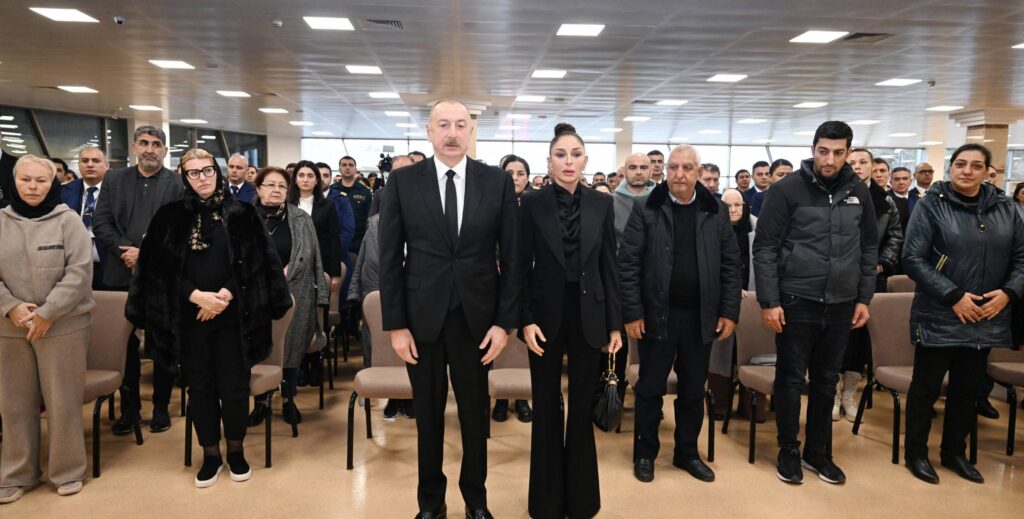
When I was in Azerbaijan in March, the temperature had calmed down, people still remembered, but was not the vociferous anger that we had seen late December, early January. I think that might be, again, what will happen this time. Baku understands it has a very big neighbor to the north. It has a neighbor with ambitions, and it has to be managed, just as Baku understands it’s got a neighbor to the south, it has to be managed.
The Azerbaijanis have shown themselves very good at trying to manage this. The Kazakhs have the great term “multi-vector diplomacy.” That’s not a term that you really hear in Baku, but President Aliyev very much notes Azerbaijan as a country, of Asiatic, European, Christian, Muslim – it bridges certain things, and as the person managing the bridge, understands he’s got handle both sides of what’s on the other sides of those bridges.
Meurmishvili: How do you view Russia’s attitude, policies, presence in Azerbaijan right now? There is a theory that because of its war in Ukraine, Russia is slowly losing grip on the Caucasus, be it Armenia, Azerbaijan, Georgia is a different case in this case, but what do you think Russia is thinking or the Kremlin is thinking as it comes to this, as you say, complicated or more complicated relations with Azerbaijan?
Cekuta: What we’ve seen with Russia is that this war has been a drain on Russian assets. It has been a drain on Russian capabilities, on money, on armaments using tanks from decades ago, example. If somebody had told me in February or March 2022 that Russia would be looking to North Korea to provide troops, I would have said, huh, but they are! And they’ve worked with Iran on getting drones. This told me that Russia really does not have the capabilities that we maybe thought it did. That said, in my conversations I’ve had in Azerbaijan with people coming here, people from other, from Central Asia, Kazakhstan, obviously Georgia, the Baltics and so forth, Moldova, there is this constant, there is this very prevalent fear of if Ukraine goes, we are next.
I’ve been hearing this in Azerbaijan, we’re number two on the list, but I also hear the same thing in obviously Georgia, the Baltics, the same thing from Moldova, Kazakhstan. I would say Russia cannot be taken for granted, I think it’s silly to… dangerous maybe is a better word, to think that Russia’s totally preoccupied with Ukraine, it is preoccupied with Ukraine, but it still has capability to do other things and what it might do after, and God forbid it actually does win in Ukraine, what it might do to other countries nearby… I think that’s a factor that is in the mindsets of the president’s leaderships in the countries that border Russia that were once part of the Soviet Union.
Meurmishvili: Do you think because of that Azerbaijan is trying to realign itself closer with Turkey?
Cekuta: I think that Turkey is certainly playing a more active diplomatic role in a number of different places, the Middle East as well as Ukraine, and certainly in Central Asia and the Caucasus.
There is, of course, the old line in feeling, and this is really heartfelt by Azerbaijanis, “one nation, two states” when it comes to Turkey. But there are differences, and when you talk to the Azerbaijani leadership, they will note the differences that they have with Turkey. Certainly not so much in the geopolitical sense, but sort of in a cultural sense, Islam. There’s a difference of Islam in Azerbaijan than in Turkey. They sort of more fundamentalist feeling, don’t really have that in Azerbaijan.
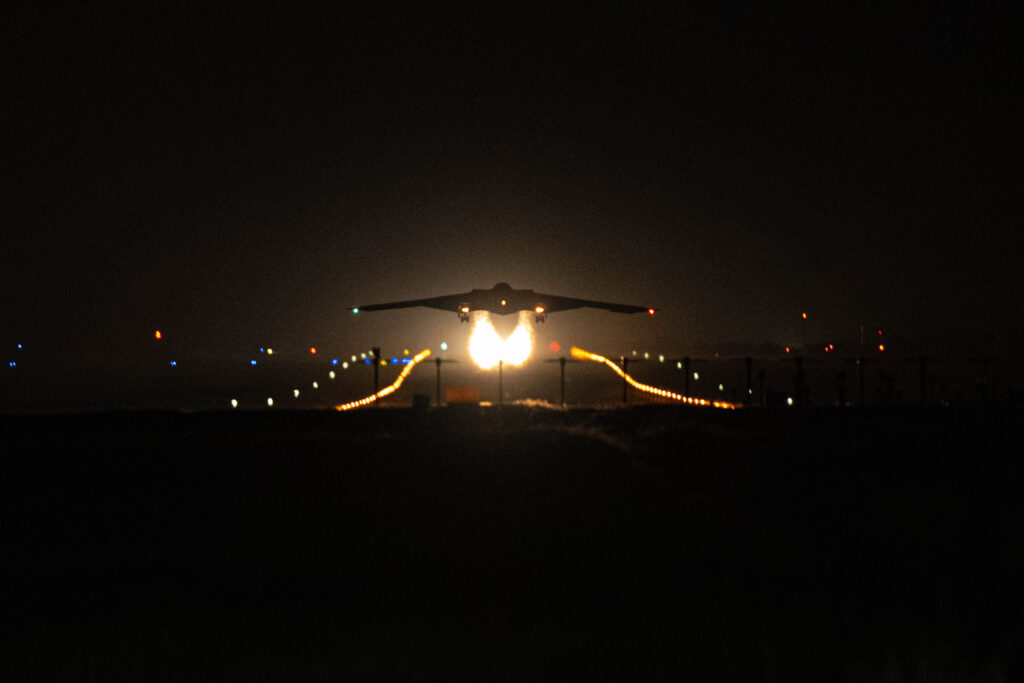
Meurmishvili: So Turkey is obviously very interested in making this relationship stronger and bigger that increases Turkey’s influence in the region. But it probably is making Iran very insecure or unhappy about that, especially given the fact that there are so many ethnic Azerbaijanis living in Iran. So, what do you think Iran is thinking about everything that’s happening in South Caucasus?
Cekuta: Iran has a lot of problems at the moment. That would probably be diplomatic understatement of the millennium. When I was posted in Baku, we talked about Iran and there was a wariness on the Azerbaijani side when it came to Iran. Certainly Iran at that point, would be 2015-2018, was highly active in the Middle East, supporting the Houthis, Hezbollah, support for Hamas, other things in the Middle East, disruptive force in Central Asia, active in Iraq, but they weren’t at that time really pushing things in the caucuses.
But there was a feeling that they could, and it was something to be taken into account. Given what’s going on since October 7th, of course, we’ve seen the Israelis, fighting Hamas, what they did to Hezbollah, we’ve seen what happened in the war with Iran in recent weeks. But Iran’s down but not out. So, there is this question of, okay, how where might they strike back next?
They may make protest noises, but it’s hard speculate on what they may do. I think they’ve got bigger and more immediate problems with Israel, with the United States, with the whole question of the nuclear program that they’ve been pursuing.
I’ve listened to some of these conversations since the U.S. bombing of Fordow and other facilities in Iran, and they’ll talk about the minorities in Iran. And then somebody said, well, what about the Azerbaijanis? And somebody quipped, well, they’re really not a minority. And the supreme leader’s mother is apparently Azeri. I’ve heard various numbers – 30, 35 million Azeris, ethnic Azerbaijanis, who live in Iran. So that’s another factor in terms of Iranian calculations.
Meurmishvili: What do you think America’s interests are or should be in Azerbaijan? How do you see that?
Cekuta: Well, think the interest that we’ve had there, by and large, continue. First of all, Azerbaijan’s independence, its territorial integrity, its sovereignty… the security of Azerbaijan and how that fits in the overall security of the region, both in terms of Europe, in terms of Central Asia, in terms of the Middle East.
Baghdad is not that far away from Baku – we tend to forget that sometimes, the European side of things. And, Azerbaijan was also a very good partner in number of ways. think famously, it sort of says a lot that the Azerbaijani troops were the last to leave Kabul in 2021 with the Americans. They were with us at the airport.
That’s something that we Americans need to remember, and Azerbaijanis remember, but I think it also says something about Azerbaijan.
Certainly we want to see Azerbaijan cooperate more closely with NATO. Its forces need to be NATO compatible. We look to Azerbaijan as a force against terrorism. It’s kind of dropped off the radar screen, but it only takes one incident and suddenly we’ll be back on the front pages of the Times or the Post or the Journal. So, that relationship is important. We look at Azerbaijan too as being a force for stability in the region. In that sense, think finding a real peace with Armenia is a critical interest. Certainly, on the economic side the energy piece remains important.
Azerbaijan has been an important contributor to energy security in Europe and globally. Azerbaijani crude is being sold to Israel for years, Azerbaijan gas going to Europe provide a cushion which really became important in 2022 with the war in Ukraine… something doesn’t always get a lot of attention. A lot of countries in the Balkans and the Balkans and others have come to Azerbaijan looking for additional hydrocarbons. That remains important. And Azerbaijan is also looking at how it and use its wind and solar, sort of moving into a new energy world and so forth. What has, of course, been sort of the real irritant in U.S.-Azerbaijani relationships has been on the human rights side. Now, with this administration, that may be a different situation.
But I think that we do have very definite security interests, very definite economic interests. We regarded Azerbaijan as a strategic partner when I was there, before I was there. And there’s good reason for doing so. They bring a lot to the table.
Meurmishvili: Let’s talk a bit more about the peace process or final peace agreement with Armenia. It looks like there are just a couple of big items but small number of issues that need to be still agreed upon. Do you anticipate the agreement anytime soon? Where does it stand at this point?
Cekuta: I’ve seen statements saying basically the peace agreement has been resolved. What I understand, and my own information on this may be wrong, so you can count this as sort of why we need to learn more about the region. The real issues have been this question about the references in the Armenian Constitution to lands that are not in Armenia. This question of is this, you we get this agreement signed, but in the back of Armenia’s mind is there’s still sort of a more aggressive intent. I know this is something that is under discussion among various diplomats, particularly between the Azerbaijanis and the Armenians. I think that this is sometimes that can get lost in some of the discussions that go on in the South Caucasus. There’s something that plays to your side, but you’ve got to remember that the other side has to deal with these things. In an ideal world, we would see this agreement signed. I think there is a desire to do so. I think Turkey also would like to see this agreement signed. I’ve heard that from Turkish officials.
We’re looking at 30 plus years of hostility between Azerbaijanis and Armenians. I would constantly hear from Azerbaijanis, well we used to live together great and people would intermarry… and it didn’t really matter if it were Azeri or Armenian… That was then. We’ve had decades of children growing up learning… who are now in their 30s uh… that the other side is the enemy who’s going to kill me. That’s going to take building that peace is going to be hard and it’s going to require more than just signing an agreement. It’s going to require real effort by both sides. It’s going to require help from outside. I would like to see the U.S. help with that. We have done that in other countries.
Meurmishvili: Azerbaijan and Armenia have never been closer to lasting peace than now, at least since the dissolution of the Soviet Union. That potentially opens up opportunities for both of sides – maybe more so for Azerbaijan than for Armenia. So, let’s talk about the Zangezur corridor for a moment. If you would just explain to the viewers what it is and why are we talking about this now?
Cekuta: The reality for Azerbaijan is that an important piece of it, Nakhchivan, is physically separated, I think it’s 40 kilometers of Armenian territory. Armenia goes down to the Iranian border and then blocks road surface access from what we refer to as mainland Azerbaijan from Nakhchivan. Now, the question has been, and it’s been talked about in different ways. We’ve talked about this as a corridor, which for the Armenian side and for others, conscious images in the only corridor anybody remembers is Danzig in 1939, which was used by the Nazis as a pretense to go to war with Poland and really kick off World War II.
So, there’s a certain nervousness about that. At the same time, Azerbaijanis don’t want the Armenian side to suddenly stop traffic between Nakhchivan and mainland Azerbaijan, either road traffic or rail traffic. There is a rail line that’s there since Soviet times, possibly, before. Azerbaijan for years has had agreements with Iran where trucks could go into Iran and they would coast along the south side of the Aras River and then go back up into Nakhichevan. That depended on Iranian goodwill on certain days, which is one reason why the Azerbaijani’s are also nervous. Another factor coming back to the question of Azerbaijani-Iranian relations. I think where the world is today, there are examples where you could find ways to be able to move traffic through that would not be interrupted.
Meurmishvili: And, that’s the biggest concern that Armenians have. It’s connected to their sovereignty. It’s a major issue.
Cekuta: Yeah, and again, the Azerbaijan is a concern about their side. So we’ve got both sides with the same side of concerns. So are there ways that this can be done? And I think, again, where we are now entering into the second quarter of the 21st century, there are lots of ways that we have developed in recent years for controlling traffic that don’t require the kinds of intrusive controls that were needed years ago. I think we could use that in those technologies to enable transit back and forth.
Meurmishvili: What would be the strategic implication of having this corridor?
Cekuta: Well, actually that’s an important. We talk a lot about the middle corridor, which is this idea of, I mean, the New Silk Road, whatever you want to call it, even the BRI, connecting China with Europe again, overland. I think this could be part of that. There was certainly that already existing in terms of the new rail connections that go from a lot across Azerbaijan to Georgia and then into Turkey and so forth to the west, or the other way going east across the Caspian. I think it would be, flesh out that route. It would flesh out a new ability to grow more trade, more economic connections. I think, too, what it would do is bring Armenia more into the mix. Armenia, to my mind, self-isolated from the rest of the region during all the years of the Karabakh conflict. So what this would do is bring Armenia into this central middle corridor process and build up connections with its neighbors and increase prosperity in Armenia. I think building trade between Armenia and Turkey is very important. I think it’s to be part of the way of doing that.
Meurmishvili: What do you think this would do to Georgia?
Cekuta: Georgia is the route right now, going across Azerbaijan and Georgia and through. I think there’s room for more than one road. And I think, more connectivity can bring more economic activity and more prosperity to everybody.
Meurmishvili: There is some concern among some in Georgia that this may diminish Georgia’s role as a strategic hub for the region. What do you think about that?
Cekuta: I don’t think it necessarily does. I think, again, I want come back to this point that the Silk Road wasn’t this Jersey Turnpike across Asia. You know, even think about the Jersey Turnpike, there are a lot of towns along the way, a lot of businesses along the way, and frankly the turnpike has facilitated growth. As a New Yorker quoting New Jersey, it’s probably sort of a scary concept to any American but the idea is that by increasing the economic connectivity, by increasing the interaction among people, companies in that region, no matter which border they’re sitting on, it’s going to increase prosperity for everybody. There’s a lot of potential, a lot of creativity in Georgia, there’s a in Armenia, there’s a in Azerbaijan. Getting these groups together, letting them interact, letting them build off each other is going to benefit everybody. I think right now we still have this idea of if my neighbor gets something, I’m going to lose. It doesn’t need to be like that.
Meurmishvili: Ambassador Cekuta, thank you very much for your time and your thoughts and your insights into giving some context to everything that’s happening in this small but very, very complicated region. I appreciate your time.
Cekuta: Now it is an important part of the world and governments in other countries, including my own, often need to remember that. So thank you very much for opportunity.

